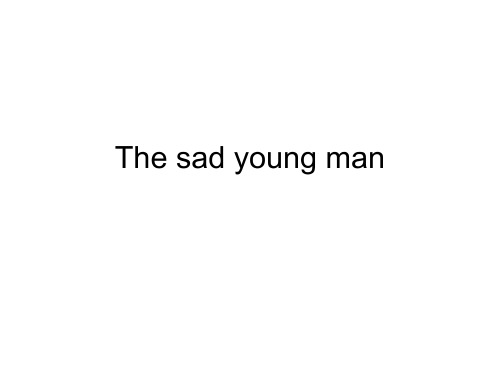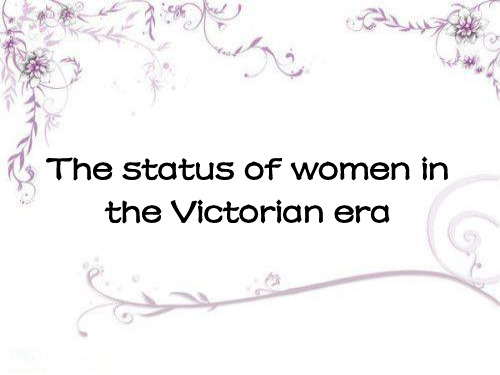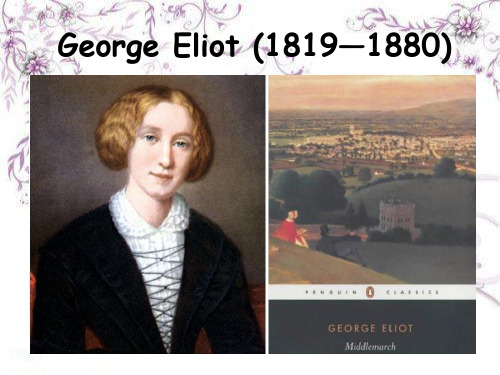Victorian Morality
- 格式:doc
- 大小:50.00 KB
- 文档页数:2


The Modern period Introduction现代时期简介Modernism rose out of skepticism and disillusion of capitalism.现代主义的兴起源于对资本主义的怀疑和幻灭。
The first world war and the second world war had greatly influenced the English literature.第一次世界大战和第二次世界大战极大地影响了英国文学。
The catastrophic First World War tremendously weakened the Brish Empire and brought about great sufferings to its people as well.灾难性的第一次世界大战极大地削弱了布里什帝国,也给其人民带来了巨大的痛苦。
Its appalling shock severely destroyed people’s faith in the Victorian values.其骇人听闻的冲击严重摧毁了人们对维多利亚时代价值观的信心。
The postwar economic dislocation and spiritual disillusion produced a profound impact upon the British people who came to see the prevalent wretchedness in capitalism.战后的经济混乱和精神幻灭对英国人民产生了深刻的影响,他们看到了资本主义普遍存在的悲惨状况。
The Second World War marked the last stage of the disintegration of the British Empire.第二次世界大战标志着大英帝国解体的最后阶段。




The-Sad-Young-Men-习题答案The Sad Young Men 习题答案/answerⅡ.1.The younger generation of the 1920s were thought to be wild because 1hey visited speakeasies, denouced Puritan morality, etc. (See para. 1).2. "Yes" and "no Yes" because the business of growing up is always accompanied by a Younger Generation Problem, "no" because all their actions can now be seen in perspective as being something considerably less sensational than the degeneration of jazz mad youth.3. Yes. Youth was faced with the challenge of changing the standards of social behavior, of rejecting Victorian gentility. But in America the young people tried to escape their responsibilities and retreat behind and air of naughty alco-holic sophistication and a pose of Bohemian immorality.4. The revolt was logical and inevitable because of the conditions in the age. First of all, the rebellion affected the entire Western world. Second, people in the United States realized their country was no longer isolated in either politics or tradition and that they could no longer take refuge in isolationism.5. All the activities mentioned above were means to help the young people to escape their more serious responsibilities of changing society and most young people went in for these activities. It became a general pattern of behavior.6. The war whipped up their energies but destroyed their naivette. It made them cynical. They could not fit themselves into postwar society so they rebelled and tried to overthrow completely the gentel standards of behavior.7. Intellectuals and non-intellectuals began to imitate the pattern of life set by those living in Greenwich Village. These people lived a Bohemian and eccentric life. They defied the law and flouted all social conventions. They attacked the war, Babbittry, and "Puritanical" gentility.8. These young intellectuals wanted America to become more sensitive to art and culture, less avid for material gain, and less susceptible to standardization.9. They emigrated to Europe because there "they do things better" than in the United States where people only care for money and wealth. Only in Europe will they be able to find remedy for their sensitive minds.10. They were called the "lost generation" by Gertrude Stein because they were troubled and worried and had emigrated to Europe. But they were never really lost for they finally returned to America and produced the liveliest, freshest, most stimulating works in America's literay experience.Ⅲ.1. The structural organization of this essay is clear and simple. The essay divides logically into paragraphs with particular functions: to introduce the subject (introduction) in paragraph 1, to support and develop the thesis (the body or the middle) in paragraphs 2 through 9, to bring the discussion to an end (conclusion)in paragraphs 10 and 11.2. Horton and Edwards state their thesis in the last paragraph of the essay:"The intellectuals of the Twenties, the "sad young men", as F. Scott Fitzgerald called them, cursed their luck but didn't die; escaped but voluntarily returned; flayed the Babbits but loved their country, and in so doing gave the nation the liveliest, freshest, most stimulating writing in its literary experience. "3. They support their thesis by providing historical material concerning the revolt of the younger generation of the twenties in a series of paragraphs and paragraph units between the introduction and conclusion.4. Yes. Each paragraph or paragaph unit develops a new but related aspect of the thought stated in the thesis. Frequently the first sentence of these middle paragraphs states clearly the main idea of the material that follows and indi- cates a new but related stage of the developing thought. For example : The rejection of Victorian gentility was, in any case, inevitable. (paragraph 3). The rebellion started with World War I . (paragraph 5) Greenwich Village set the pattern. (paragraph 7) Meanwhile the true intellectuals were far from flattered. (parageraph 9).5. The two paragraphs form a single unit. The writers begin .with a clearly stated main idea -- Greenwich Village set the pattern and use paragraph 1 to explain Green- wich Village to the reader, following in paragraph2 with sup-porting material showing how the rest of the country imitated life in the "Village".6.Student' s choice.7.Student's choice.Ⅳ.1.At the very mention of this post-war period, middle-aged people begin to think about it longingly.2.In any case, an American could not avoid casting aside its middle-class respectability and affected refinement.3.The war only helped to speed up the breakdown of the Victorian social structure.4.In America at least, the young people were strongly inclined to shirk their responsibilities. They pretended to be worldly-wise, drinking and behaving naughtily.5.The young people found greater pleasure in their drinking because Prohibition, by making drinking unlawful added a sense of adventure.6.Our young men joined the armies of foreign countries to fight in the war.7.The young people wanted to take part in the glorious ad-venture before the whole war ended.8.These young people could no longer adapt themselves to lives in their home towns or their families.9. The returning veteran also had to face Prohibition which the lawmakers hypocritically assumed would do good to the people. 10. (Under all this force and pressure) something in the youth of America, who were already very tense, had to break down.11. It was only natural that hopeful young Writers whose minds and writings were filled with violent anger against war, Babbitry, and "Puritanical" gentility, should come in great numbers to live in Greenwich Village, the traditional artistic centre.12. Each town was proud that it had a group of wild, reckless people, who lived unconventional lives.Ⅴ. See the translation of the text.Ⅵ.1. flapper: (Americanism) (in the 1920s) a young woman considered bold and unconventional in action and dress2. provincial: narrow, limited like that of rural provinces3. code: any set of principles or rules of conduct; a moral code4. Prohibition: the forbidding by law of the manufacture, transportation, and sale of alcoholic liquors for beverage purposes~ specifically in the U. S., the period (1920-1933) of prohibition by Federal law5. agent : an active force or substance producing an effect , e.g. , a chemical agent6. orgy: any wild, riotous, licentious merrymaking; debauchery7. Greenwich Village : section of New York City, on the lower west side of Manhattan: noted as a center for artists, writers, etc.8. draft : the choosing or taking of an individual or individuals from a group for some special purpose, especially for compulsory military service9. distinction: the quality that makes one seem superior or worthy of special recognition10. action: military combat in general11. whip up: rouse; excite12. give: bend, sink, move, break down, yield, etc. from force or pressure13.burden:repeated,central idea;theme14.keep up with the Joneses:strive to get all the mat erial things one’s neighbors or associates have15.write off:drop from considerationⅦ.1.speakeasy:a place where alcoholic drinks are sold illegally,esp.such a place in the U.S.during Prohibition2.sheik:a masterful man to Whom women are supposed to be irresistably attracted3.drugstore cowboy:A western movie extra who loafs infront of drugstores between pictures4.soap opera:a daytime radio or television serial drama of a highly melodramatic,sentimental nature.It has been so called since many original sponsors were soap companies.5.Babbittry:(after George Babbit,title character of a satirical novel(1 922)by Sinclair I.ewis)a smugly conventional person interested chiefly in business and social success and indifferent to cultural values:Philistine6.fast:(adjectl‘ve)living in a reckless,wild,dissipated way7.boobery:same as Babbittry,smug,self—satisfied,conformist in cultural mattersⅧ.1.flourish意为向很理想的状况发展或正处于该状况,即发展的鼎盛时期。
苏州大学应用技术学院2009级学士学位论文A Study of Color Symbolism in The Great Gatsby《了不起的盖茨比》中颜色象征意义研究专业:09英语学号:0916411014姓名:周丽莎导师:张荣兴2012.12.23AcknowledgementsThe thesis would probably have never been possible without the help, support, foresight and inspiration of my supervisor, teachers and classmates, so I would like to take this opportunity to express my heartfelt gratitude to all of them.My deepest gratitude goes first to my supervisor, Mr. Zhang Rongxing, who has contributed to getting the nuts and bolts of the thesis into place. His careful and microscopic scrutiny of the manuscript resulted in the elimination of many inconsistencies and in the development of the study throughout the thesis. His witty ideas and valuable advice brought me a new way of learning and different vision of the research.What’s m ore, my thanks go to my parents and friends who give me support and encouragement.AbstractFrancis Scott Fitzgerald, one of the most prominent novelists in American literary history in the 1920s, has been regarded as “the singer of the jazz age”, and “chronicler” and “poets Laureate”. He works give us an accurate picture of the social state of America in early twenties of last century. The Great Gatsby is Fitzgerald’s finest n ovel, which was published in 1925, and Eliot considered it “to be the first step that America has taken since Henry James”. Finished in 1925, this novel wins lots of favorable praise. Nowadays, people keep reading it, and many films have been adopted from it.Just as above said, The Great Gatsby is a symbolism story, in which, many color symbols are used, for example, green and green light, blue, yellow or golden and so on. This paper will analyze the novel by means of the respective symbolism meanings of these color symbols.Key words: Francis Scott Fitzgerald; The Great Gatsby; color; symbolism.摘要美国著名象征主义代表作家Francis Scott Fitzgerald ,20世纪20年代美国文坛最著名的作家之一,素有爵士时代代言人,编年史家和桂冠诗人的称号。
First of all, the British have a longer history than the United States or other European countries. The feudal rule of a British makes people more tolerant, the quality of the content and the British are an isolated island on the European continent. Despite the geographical concept, we think that English is a part of Europe, but in fact, the isolated geographical position makes Britain and Europe think that "one independent" We also talked about one of the most famous Queen Victoria in British history.During the six years of Queen Victoria's rule, Queen Victoria gradually became the British heyday. At the same time, she was also British During the main period of the formation of national etiquette, Queen Victoria finally made Britain a world-famous "formal country". Because of her elegant personal cultivation and European reputation, Queen Victoria made a series of strict rules for her children, all of which were trained in the aspect of criticizing.She was very strict with herself, elegant and decent, dignified and warm The characteristics of wenerya (dignified and decent), no Victorian customer will be called "Social Science (exquisite queen of England) has had a great impact on the middle class (from the scale). From this period, they have the highest standard of imitating gentlemen and other gentleman's words. This is the final formation and improvement of Victorian British gentlemen, ofcourse, with the development of society and the country With the deepening of international communication, British personality changes subtly with the change of values, which unconsciously affects the gentlemanly generation.The British understand the potential of their culture. Language and culture are of great benefit to the mastery of Westerners.。
Victorian morality is a distillation of the moral views of people living at the time of Queen Victoria (reigned 1837 - 1901) in particular, and to the moral climate of Great Britain throughout the 19th century in general that were in stark contrast to the morality of the previous Georgian period. It is not tied to this historical period and can describe any set of values that espouses sexual repression, low tolerance of crime, and a strong social ethic. Due to the prominence of the British Empire, many of these values were spread across the world.
Historians now regard the Victorian era as a time of many contradictions.
A plethora(过多) of social movements concerned with improving public morals co-existed with a class system that permitted harsh living conditions for many. The apparent contradiction between the widespread cultivation of an outward appearance of dignity and restraint and the prevalence of social phenomena that included prostitution and child labour were two sides of the same coin: various social reform movements and high principles arose from attempts to improve the harsh conditions.
The term Victorian has acquired a range of connotations, including that of a particularly strict set of moral standards, which are often applied hypocritically. This stems from the image of Queen Victoria—and her husband, Prince Albert, perhaps even more so—as innocents, unaware of。